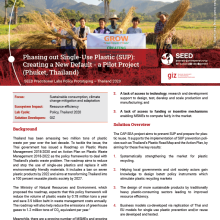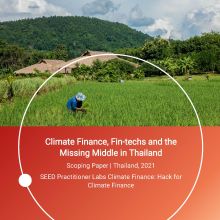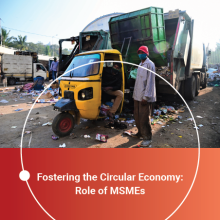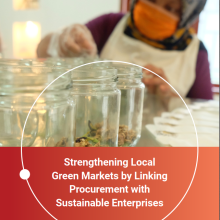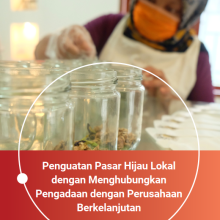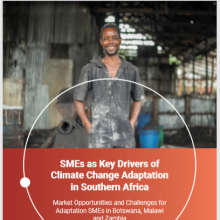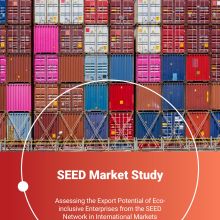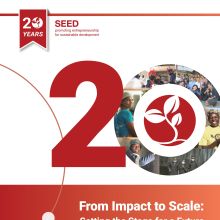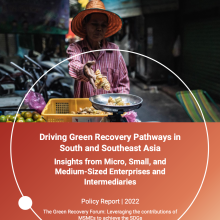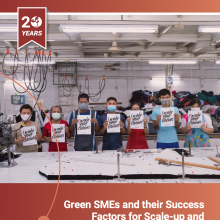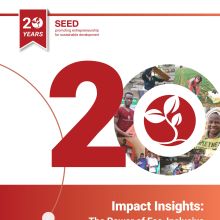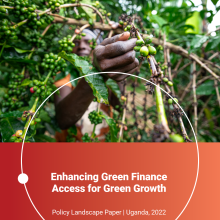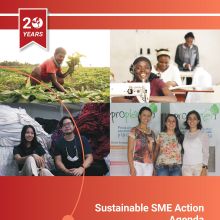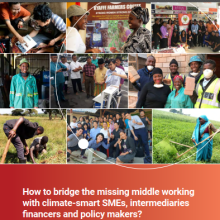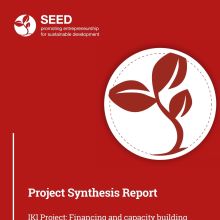- This snapshot report is intended for national policy makers and shapers; global policy and finance institutions; researchers and civil society networks. Drawing on direct insights from micro, small and medium enterprises as well as eco-system support organisations, it highlights the existing support gaps, concrete examples and new opportunities for catalysing a green, inclusive recovery from COVID-19.
- In this primary edition of a series of reports, we illuminate the black box of eco-inclusive entrepreneurship by providing readers with a first-of-its-kind comprehensive typology on eco-inclusive SMEs.
- This scoping paper provides the basis for the implementation of the collaborative, multi-step process of the SEED Hack for Climate Finance in Thailand in 2021. Thailand’s high environmental richness and fastly evolving landscape of small- and medium-sized enterprises (SMEs) present a significant opportunity for the country to meet its climate action and development objectives. In particular, climate-smart SMEs- offering products and services for climate change adaptation and/or mitigation- are well-positioned to absorb and scale the environmental, social, and economic impacts of global climate finance flows in line with Thailand’s climate action objectives.
- The Circular Economy (CE) policy context as it relates to micro, small and medium enterprises (MSMEs) in India is essential to integrating and mainstreaming the transition to the circular economy in India.
- The Indonesian government has placed a strong emphasis on the development of local economies across the country, and have put into place important steps to align government spending on procurement with this priority. Linking eco-inclusive MSMEs to public procurement opportunities can leverage the potential for MSMEs to drive local sustainable economic development through their growth.
- Pemerintah Indonesia telah memberikan penekanan yang kuat pada pengembangan ekonomi lokal di seluruh negeri, dan telah menempatkan langkah-langkah penting untuk menyelaraskan pengeluaran pemerintah untuk pengadaan dengan prioritas ini. Bersamaan dengan kampanye #BanggaBuatanIndonesia untuk mendorong minat dan permintaan barang dan jasa produksi dalam negeri, Peraturan Presiden Nomor 12 Tahun 2021 tentang Pengadaan Barang dan Jasa Pemerintah (“Peraturan 12/2021”) mewajibkan Kementerian, Lembaga, dan Pemerintah Daerah untuk menggunakan setidaknya 40% anggarannya untuk mendapatkan produk dalam negeri dari usaha mikro dan koperasi. Prioritas untuk mendukung usaha mikro, kecil dan menengah (UMKM) untuk mengakses pasar melalui belanja pemerintah berpotensi mendorong upaya pemulihan ekonomi di tingkat lokal dan nasional.
- The report expands the still-nascent body of case study-based literature on adaptation entrepreneurship, and is thus suited for academia and practitioners active in this field. It is the first one to identify opportunities for successful adaptation entrepreneurship as well as barriers to growth and scale in the region.
- Manifested through the SDGs and the Paris Climate Agreement, the international community has agreed to tackle prevalent economic, environmental, and social challenges, whereby the private sector and businesses can make a pivotal contribution. This report analyses the international market potential of end-consumer products offered by enterprises from the SEED network from a supply and demand perspective, as well as identifying possible avenues for support.
- In honour of SEED’s 20th anniversary, this report aims to assess 2 decades of SEED’s work and takestock of what has been accomplished. Within 20 years, SEED has supported 2000 enterprises in 41 countries across 3 continents. These enterprises are the champions of the green transition. Working on the ground, they target the most severe impacts of climate change across 6 key sectors: biodiversity, green technologies, clean energy, sustainable agriculture, waste management and water, sanitation and health.
- The purpose of this Driving Green Recovery Pathways in South and Southeast Asia: Insights from Micro, Small, and Medium-Sized Enterprises and Intermediaries report is to showcase the importance of green and social MSMEs to drive Green Recovery and identify the supports that the intermediary and policy could provide. The insights in this report are derived from The Green Recovery Forum: Leveraging the contributions of MSMEs to achieve the Sustainable Development Goals.
- This report analyses small and medium-sized enterprises (hereby SMEs) with green business models and explores how selected enterprises scale and replicate their activities. Its main objective is to provide insights into the critical success factors for scaling and replication. It is intended for policymakers and intermediaries to draw direct insights from SMEs. It analyses the critical success factors for scale-up and replication of enterprise activities and highlights concrete recommendations to close existing gaps in order to maximise their contribution to the SDGs. Green SMEs can find inspiration through the case studies in the annex of this report. This report was prepared in collaboration with GO4SDGs.
- Celebrating SEED’s first 20 years and aware of the work that remains to be done, we take this opportunity to share valuable insights into the environment of eco-inclusive enterprises and the BDS ecosystem. Have a look at our 20 Year Impact Flagship Report: The Power of Eco-Inclusive Enterprises and BDS Providers.
- This policy landscape paper provides an overview of the state of green finance in Uganda, an overview of the relevant legal and regulatory frameworks, and highlights the challenges to accessing (by MSMEs) and delivering (by banks and finance institutions) green finance in Uganda.
To scale Green SME Support for 2030, SEED, GO4SDGs and UNEP jointly build on their collective experiences to formulate lessons learned and critical next steps to inform this Sustainable SME Action Agenda. Validated through a global consultation process involving key regional SME Stakeholder, this Action Agenda outlines critical next steps to empower the micro, small and medium-sized enterprises and build forward better.
The objective of this impact report is to gain consolidated impact insights and lessons learned from the International Climate Initiative (IKI) financed SEED project: Financing and capacity building for micro and small climate-smart enterprises: Filling the gap of the missing middle.
This report draws on the insights and action-oriented research from the SEED Practitioner Labs Climate Finance (PLCF) and the SEED Green Finance Academy (GFA) in the years 2019-2023. It also builds on the lessons from 20 years of experience of the SEED Programme supporting climate-smart SMEs along their scale-up and finance journeys.
This report summarises the results and outputs from the International Climate Initiative (IKI) financed SEED project: Financing and capacity building for micro and small climate-smart enterprises. Filling the gap of the missing middle from 2019-2024.


